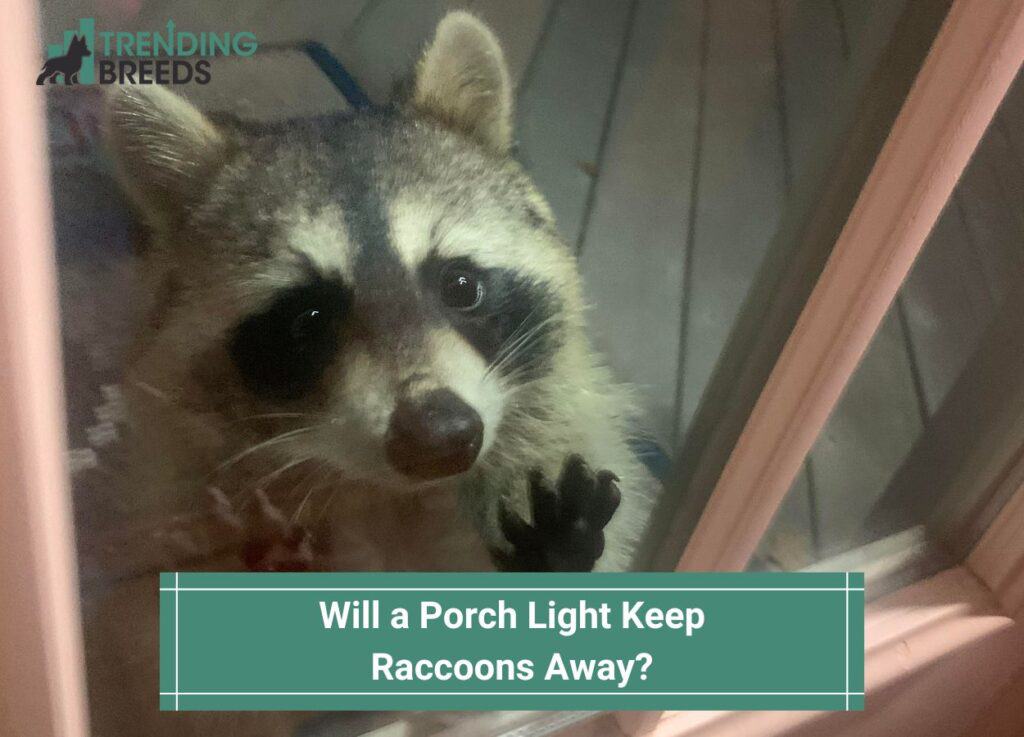
Raccoons are known to enter homes and cause significant property damage while searching for food.
If you’ve been looking for a way to keep raccoons away, you may have come across porch lights.
Porch lights are a pretty effective way to keep raccoons away from your property.
This is because raccoons are nocturnal creatures that love to function at night. The illuminated areas around your property will deter them.
Keep reading below for more information about the effectiveness of porch lights as raccoon deterrents.
Before you scroll further down this guide, check out these other animal-related articles: What Does Possum and Raccoon Poop Look Like? and Will My Puppy Survive Parvo?.
Table of Contents
Are Raccoons Nocturnal?
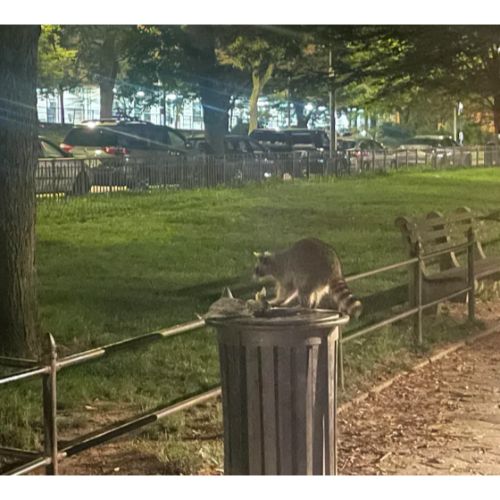
Raccoons are primarily nocturnal creatures. Even though they sometimes come out during the day, the night is when they really shine.
They will hunt, scavenge, and consume food at this time of the day.
Research has shown that nighttime is when raccoons feel most at ease and can demonstrate their greatest skills.
They also have a deep understanding of the moon and the several phases it goes through.
A bright moon free of clouds will cast light, which can indicate both danger and opportunity.
Therefore, it really shouldn’t come as a big surprise to discover that clever animals are even more vigilant when there is a full moon.
During their hunting and foraging activities, males can cover well over three square kilometers of territory.
Females cover a somewhat smaller territory than males, particularly if they have young ones who require their attention.
Raccoons are occasionally seen during the day; however, it is unusual for them to remain active for extended periods during the daylight hours.
They might sneak out to grab a bite whenever the chance presents itself.
They will take action to defend their nest if it is bothered or endangered during the day, but if that fails, they will move on in search of another place to take refuge.
Do Porch Lights Keep Raccoons Away?

It is common practice to suggest installing porch lights as a deterrent measure to keep raccoons from entering homes and gardens.
Raccoons typically search for food and hunt during the night, so the illumination of the area by the lights is intended to make it less tempting to the animals, as they normally do not venture out during the day.
However, there is some disagreement among specialists about how beneficial this approach is.
The scientific community has not yet concluded whether or not porch lights work to keep raccoons away.
A minority of specialists say the lights have little effect on raccoon behavior and only aid the animals in navigating the region.
According to a study at the University of Nebraska, although raccoons were initially scared away by bright lights, they quickly got used to them and started ignoring them after a short while.
However, a different study by Cornell University researchers found that porch lights might work as a deterrent when combined with other tactics like fences or repellents.
In general, it seems that the efficacy of porch lights as a raccoon deterrent could depend on a number of different aspects, such as the brightness and duration of the lights, the habits, and behaviors of the area’s raccoon population, and whether there are additional deterrents in the surrounding area.
Without a foolproof solution, porch lights could be a useful addition to a larger plan to eliminate raccoons from your area.
Can Raccoons Spread Diseases to Humans?

Raccoons are known to harbor several bacterial illnesses and parasites, and these pathogens can be passed on to humans and their pets either by a bite or through the consumption of waste products left behind by raccoons.
Several infectious diseases can infect both humans and animals.
- Leptospirosis
- Salmonella
- Roundworm
- Rabies
Despite the widespread belief that raccoons are carriers of the fatal rabies virus, there has been only one documented case of a human being falling victim to raccoon rabies in the entire history of the United States.
Aggressive behavior, strange vocalizations, and an abnormal amount of drool or froth coming from the mouth indicate that a raccoon may be infected with rabies.
Call your local animal control agency as soon as possible if you have any reason to believe you have located a raccoon infected with rabies.
Raccoon Infestation Warning Signs
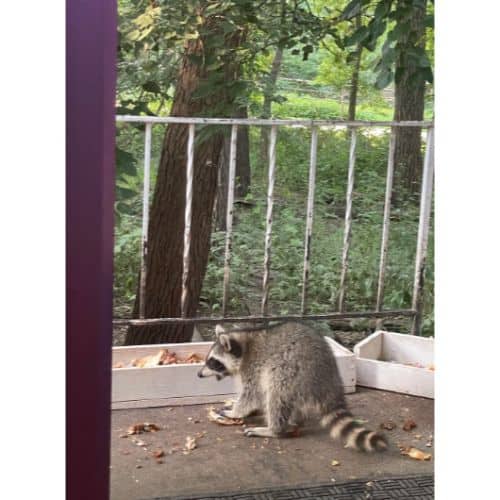
In this section, we’ll discuss some warning signs of a raccoon infestation around your property.
Paw Prints
The most telltale symptom of a raccoon population in or around your house is the presence of paw prints.
According to Alderleaf Wilderness College, the paws of a raccoon have five finger-like toes and a diameter that is between two and three inches across.
Raccoon trails have a distinct and recognizable pattern. According to Alderleaf Wilderness College, a step’s average length is between 10 and 18 inches.
Property Damage
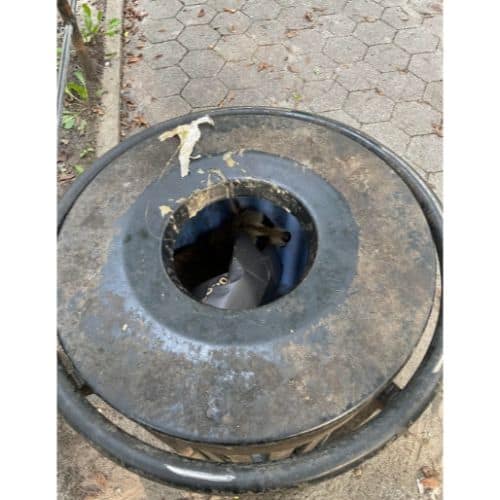
If raccoons try to break into your house, they will leave telltale signs.
Roofs, soffits, attics, basements, doors, windows, and crawl spaces are all common targets for destruction.
400;”>They could also damage your furniture or flooring with their claws.
Food Scraps
The garbage in your yard may be just litter, but it’s also a common clue that raccoons are nearby.
Westchester Wildlife reports that raccoons will forage through a trash can for food because it is the most convenient option.
Nesting
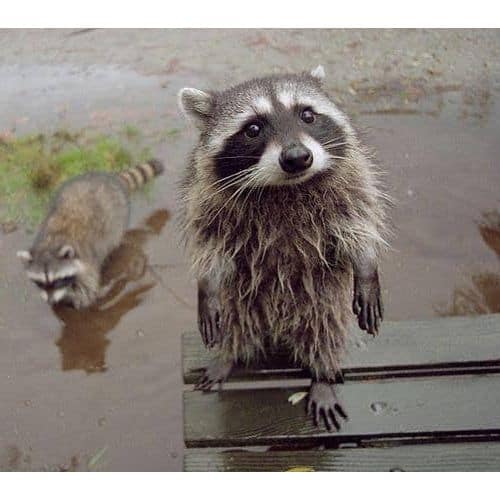
Raccoons construct nests for shelter and protection. Branches, leaves, grass clippings, and hay are all common nesting materials.
They also use manufactured goods such as clothing, paper, and construction materials.
Urine or Feces
Raccoons won’t think twice about using your house or yard as a toilet. Their feces don’t resemble those of deer or other typical pests.
Critter Control says they are typically black and cylindrical with blunt ends.
You can usually locate their feces near other clues, such as nesting materials or structural damage to the outside of your home.
Scratching or Scurrying Sounds
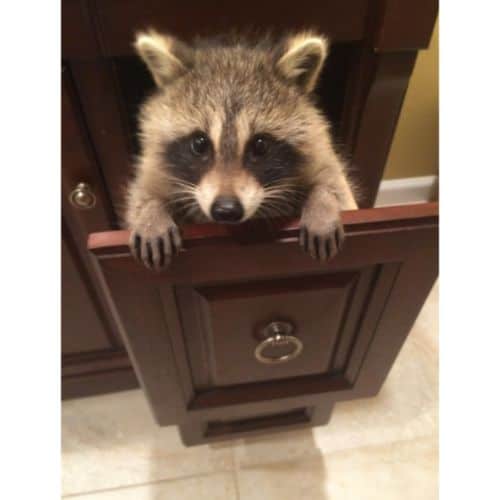
Do you hear movement up in the attic?
You may be dealing with a rat infestation, but it might also indicate a greater problem, such as a raccoon.
According to Trutech Wildlife, a raccoon’s typical vocalizations include scurrying, purring, chittering, and snarling.
Damaged Tree
The raccoon is a master of the treetops. They may run up a tree for protection, to reach higher branches for foraging, or simply for fun.
Raccoons, like dogs, will use their pee to mark territory on trees.
Raccoons may have left evidence of their climbing and descending on the tree itself.
Find broken branches or smooth bark that appears as though claws wore it out.
Pet Behavior

Due to their acute sense of hearing and natural predation tendencies, dogs and cats can detect a raccoon far quicker than their owners can.
Pets with separation anxiety may pace the floor, pace the ceiling, avoid particular areas of the house, or just whine.
That’s when you should start looking for raccoons’ telltale signs.
Options for Raccoon Control

To reduce the likelihood of a raccoon colony establishing itself, homeowners can take several preventative measures.
Raccoons can get into homes through damaged vents, holes, open chimneys, and other spaces across the roof, so it’s important for residents to routinely check for, fix, and cover any such entrance points.
In addition to fixing any loose roofing or shingles, it’s a good idea to put a mesh cover or cap over any chimneys or other easily accessible spaces.
It is recommended that households keep their garbage in a lockable shed or outhouse.
Raccoons are experts at figuring out how to open garbage cans, so it’s important to choose cans with lids that close securely and are animal-proof if you keep your trash out in the open.
It’s also a good idea to eliminate any food sources for raccoons and other wildlife, such as bird seed, bird feeders, and fountains.
It is necessary to constantly remove brushes, leaves, and other yard waste that might serve as shelter for raccoons.
Also, keep firewood at least 20 feet away from the house throughout the winter to prevent raccoons from using it as a makeshift home.
Consult a registered pest control expert for an inspection and to devise a strategy to exterminate raccoons if you suspect an infestation and want further information.
Homeowners should not try to eliminate the problem alone because of the risk of contracting illnesses like rabies and raccoon roundworms that the animals may be harboring.
Will a Porch Light Keep Raccoons Away?

So, if you’re considering installing a porch light to keep raccoons away, it doesn’t hurt to try.
Although the studies have been conflicting, there is some data to suggest that porch lights are effective raccoon deterrents.
If you find this guide, “Will a Porch Light Keep Raccoons Away,” informative and helpful, you can check out these other animal-related articles from our team:
You can learn more about raccoons by watching “13 Facts about Raccoons !! The Little Masked Bandits” down below:

![The Importance of Light for Hedgehogs [& How To Provide It] (2024) A person wearing a pink shirt holding a hedgehog outdoors.](https://www.trendingbreeds.com/wp-content/uploads/2021/10/Hedgehog-being-held-outside-150x150.jpg)


